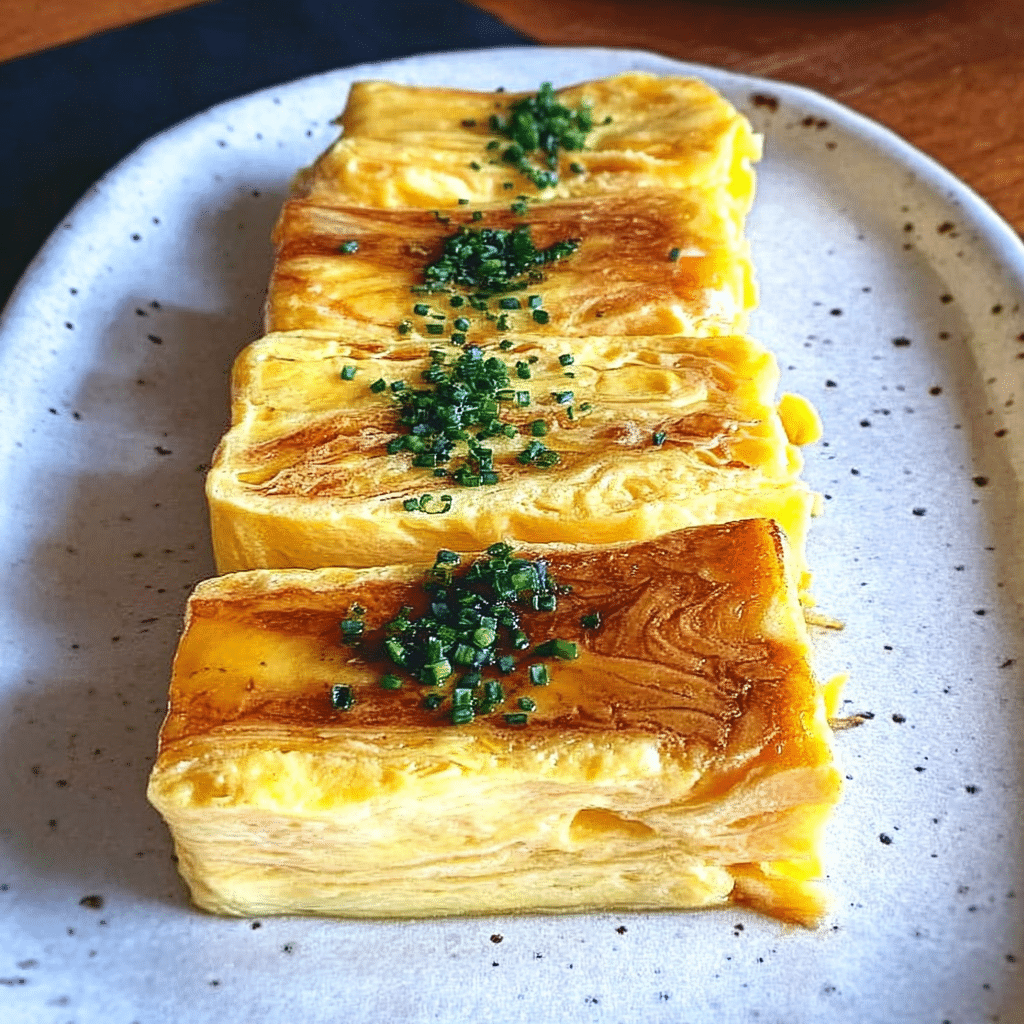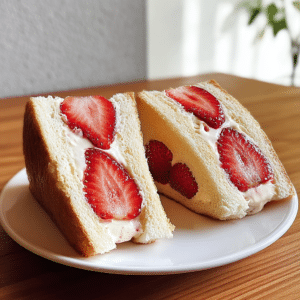Jump to:
Japanese Tamagoyaki Omelette
The Japanese Tamagoyaki Omelette stands as one of Japan’s most beloved culinary treasures, offering a perfect balance of sweet and savory flavors wrapped in silky, layered perfection. This traditional rolled egg dish transforms simple ingredients into an elegant masterpiece that graces everything from bento boxes to high-end sushi restaurants.
Why You'll Love This Recipe
- Quick and affordable recipe using just five pantry staples, making it budget-friendly at under $3 per serving
- Packed with high-quality protein and essential amino acids, supporting muscle health and sustained energy throughout the day
- Versatile dish perfect for breakfast, lunch boxes, dinner sides, or special occasions like family gatherings and celebrations
- Beautiful presentation with distinctive rolled layers that impresses guests and elevates any meal
- Customizable sweetness levels and adaptable to dietary preferences while maintaining authentic Japanese flavors
Why This Japanese Tamagoyaki Omelette Recipe Works
This recipe delivers restaurant-quality results through careful ingredient balance and proper technique. The combination of sugar and sweet rice wine creates the signature taste profile that makes tamagoyaki irresistible.
The layering method ensures even cooking while creating those beautiful spiral patterns. Using medium heat prevents burning while allowing each layer to set properly. The result is a tender, slightly sweet omelette with perfect texture.
Professional chefs appreciate this approach because it’s forgiving for beginners yet produces consistent results. The ingredients work together harmoniously – eggs provide structure, sugar adds sweetness, and soy sauce contributes umami depth.

What You’ll Need for Japanese Tamagoyaki Omelette
Ingredients
| Ingredient | Quantity (Approx) | Purpose / Notes |
|---|---|---|
| Large eggs | 4 pieces | Main protein base, creates structure and texture |
| Sugar | 1 tablespoon | Provides signature sweetness and helps browning |
| Low-sodium soy sauce | 1 teaspoon | Adds umami depth and savory balance |
| Sweet rice wine (mirin) | 1 tablespoon | Enhances sweetness and adds authentic flavor |
| Vegetable oil | 1 teaspoon | Prevents sticking and ensures smooth cooking |
These ingredients cost approximately $2-3 total, making this an incredibly economical dish. Fresh eggs are crucial for best flavor and texture. The sweet rice wine can be found in most Asian grocery stores or ordered online.
Tools
| Tool | Purpose |
|---|---|
| Non-stick frying pan (8-10 inch) | Essential for easy rolling and preventing sticking |
| Whisk or fork | Thoroughly combines ingredients for smooth mixture |
| Silicone spatula | Gentle tool for rolling without damaging delicate eggs |
| Small bowl | Mixing container for egg mixture preparation |
How to Make Japanese Tamagoyaki Omelette
| Step | Instructions |
|---|---|
| Step 1: Prepare mixture | In a bowl, whisk together eggs, sugar, soy sauce, and sweet rice wine until completely combined and smooth |
| Step 2: Heat pan | Heat non-stick frying pan over medium heat and lightly coat with vegetable oil using paper towel |
| Step 3: First layer | Pour thin layer of egg mixture into pan, swirling to cover surface evenly and completely |
| Step 4: Begin rolling | When edges set but center remains slightly wet (about 2 minutes), roll one side toward center using spatula |
| Step 5: Add layers | Add more egg mixture, lifting rolled portion so uncooked egg flows underneath for even cooking |
| Step 6: Complete rolling | Repeat layering process until all mixture is used, then remove from heat and slice into thick pieces |
The entire process takes about 15 minutes of active cooking. Patience is key – rushing the rolling process can break the delicate layers. Each addition should flow smoothly under the existing roll.
For perfect results, maintain consistent medium heat throughout cooking. Too high heat will burn the bottom before the top sets, while too low heat won’t create proper texture.
Chef's Helpful Tips
- Strain the egg mixture through fine mesh to remove lumps and create ultra-smooth texture
- Use chopsticks or wooden spatula for more control when rolling the delicate egg layers
- Wipe pan with oiled paper towel between layers to maintain non-stick surface
- Let each layer set until just barely wet on top before adding next portion
- Roll away from yourself for better control and more even spiral formation
Serving and Storage Tips for Japanese Tamagoyaki Omelette
Serving Tips
Serve Japanese Tamagoyaki Omelette at room temperature or slightly warm for best flavor. Cut into 1-inch thick slices to showcase the beautiful spiral pattern. Arrange on a small plate with pickled vegetables for authentic presentation.
This dish pairs wonderfully with steamed rice, miso soup, and fresh vegetables. It’s perfect for family dinner spreads or elegant brunches.
For storage, wrap cooled tamagoyaki in plastic wrap and refrigerate up to 3 days. It’s delicious cold in lunch boxes or can be gently rewarmed in a pan. Avoid microwaving as it changes the texture.

Mistakes to Avoid while making Japanese Tamagoyaki Omelette
High heat is the most common mistake that leads to burnt bottoms and runny centers. Always use medium heat for even cooking throughout all layers.
Overmixing the egg mixture incorporates too much air, creating bubbles that break during cooking. Gentle whisking until just combined produces smoother results.
Adding too much egg mixture at once makes rolling difficult and creates uneven layers. Pour just enough to create a thin, manageable layer each time.
Waiting too long between layers allows the previous roll to cool and stick to the pan. Work efficiently but don’t rush the setting process.
You Must Know
- Room temperature eggs mix more easily and cook more evenly than cold eggs straight from refrigerator
- Traditional rectangular tamagoyaki pans create more authentic shapes, but round pans work perfectly fine
- Adjust sugar levels to taste preference – some families prefer sweeter versions for children
- Fresh ingredients make significant difference in final flavor, especially with eggs and sweet rice wine
Suggestions for Japanese Tamagoyaki Omelette
Experiment with additions like finely chopped scallions, grated ginger, or small shrimp for variety. These ingredients should be minimal to maintain the delicate egg flavor.
Try different sweetness levels by adjusting sugar content. Some regions prefer less sweet versions, while others enjoy more pronounced sweetness, especially for children’s bento boxes.
Consider making larger batches for meal prep. This recipe doubles easily and provides protein-rich options for quick breakfasts or healthy snack alternatives.
Serve alongside other Japanese dishes like seafood preparations for themed dinner parties. The mild flavor complements stronger tastes beautifully.
For inspiration and technique variations, check out professional chef approaches or explore different regional styles to expand your skills.

FAQs:
Yes, tamagoyaki actually tastes better after resting. Make it up to 3 days ahead and store refrigerated. It’s traditionally served at room temperature, making it perfect for meal prep and bento boxes.
You can use rice vinegar with a pinch of extra sugar, or simply increase the sugar slightly and add a splash of water. The flavor will be slightly different but still delicious.
This usually happens from cooking at too high heat or trying to roll before the eggs set properly. Use medium heat and wait until edges are set but center is still slightly wet before rolling.
While traditional rectangular pans help, you can shape round tamagoyaki by gently pressing the sides with your spatula while it’s still warm, or wrapping it in a bamboo mat for a few minutes.
Yes, it’s rich in high-quality protein, vitamins, and minerals. The sugar content is minimal per serving, and eggs provide essential amino acids. It’s a nutritious addition to balanced meals.
Conclusion
Mastering Japanese Tamagoyaki Omelette opens doors to authentic Japanese cooking while providing a versatile, nutritious dish for any occasion. This recipe balances simplicity with elegance, creating restaurant-quality results in your home kitchen.
The technique may take practice, but the basic principles are straightforward. Focus on medium heat, thin layers, and patient rolling for success. Each attempt improves your skills and brings you closer to tamagoyaki perfection.
Whether served in traditional bento boxes, elegant dinner presentations, or quick breakfast solutions, this Japanese Tamagoyaki Omelette delivers satisfaction and nourishment. The sweet-savory flavor profile appeals to all ages, making it a family-friendly addition to your recipe collection.
More Easy Breakfast Recipes:
- Spinach Egg Muffin Cups: Amazing Healthy Breakfast Recipe
- Amazing Chickpea Cucumber Salad Recipe – Fresh & Healthy
- Apple Cinnamon French Toast Recipe – Best Easy Breakfast
- Best Homemade Granola Recipe Guide
Recommended
📖 Recipe Card

Japanese Tamagoyaki Omelette
- Total Time: 25 minutes
- Yield: 3 per serving 1x
Description
A traditional Japanese sweet and savory rolled omelette with a delicate, layered texture. This authentic tamagoyaki combines eggs with mirin and soy sauce for the perfect balance of flavors.
Ingredients
- 4 pieces large eggs
- 1 tablespoon sugar
- 1 teaspoon low-sodium soy sauce
- 1 tablespoon sweet rice wine (mirin)
- 1 teaspoon vegetable oil
Instructions
- Step 1: Prepare mixture – In a bowl, whisk together eggs, sugar, soy sauce, and sweet rice wine until completely combined and smooth
- Step 2: Heat pan – Heat non-stick frying pan over medium heat and lightly coat with vegetable oil using paper towel
- Step 3: First layer – Pour thin layer of egg mixture into pan, swirling to cover surface evenly and completely
- Step 4: Begin rolling – When edges set but center remains slightly wet (about 2 minutes), roll one side toward center using spatula
- Step 5: Add layers – Add more egg mixture, lifting rolled portion so uncooked egg flows underneath for even cooking
- Step 6: Complete rolling – Repeat layering process until all mixture is used, then remove from heat and slice into thick pieces
Notes
- Strain the egg mixture through fine mesh to remove lumps and create ultra-smooth texture
- Maintain consistent medium heat throughout cooking to prevent burning while ensuring proper texture
- Let each layer set until just barely wet on top before adding the next portion for perfect layering
- Fresh eggs are crucial for best flavor and texture – this economical dish costs only $2-3 total
- Prep Time: 10 minutes
- Cook Time: 15 minutes
- Category: Breakfast
- Method: Pan-frying
- Cuisine: Japanese
Nutrition
- Serving Size: 1 serving
- Calories: 140 calories
- Sugar: 5g
- Sodium: 280mg
- Fat: 9g
- Saturated Fat: 3g
- Unsaturated Fat: 6g
- Trans Fat: 0g
- Carbohydrates: 6g
- Fiber: 0g
- Protein: 10g
- Cholesterol: 248mg
Keywords: Japanese Tamagoyaki Omelette, tamagoyaki, Japanese omelette, rolled eggs, Japanese breakfast, authentic Japanese recipe









